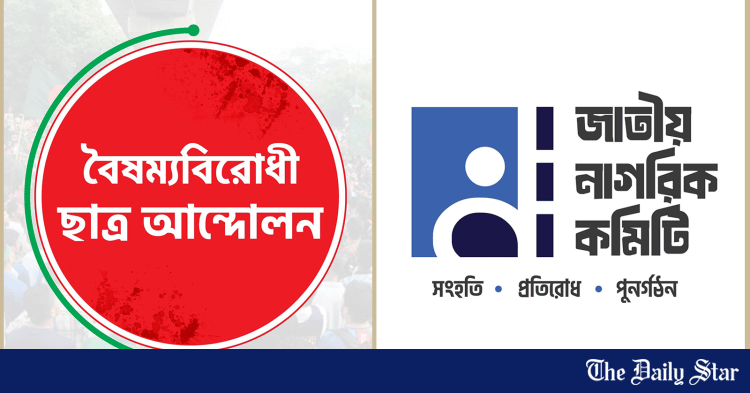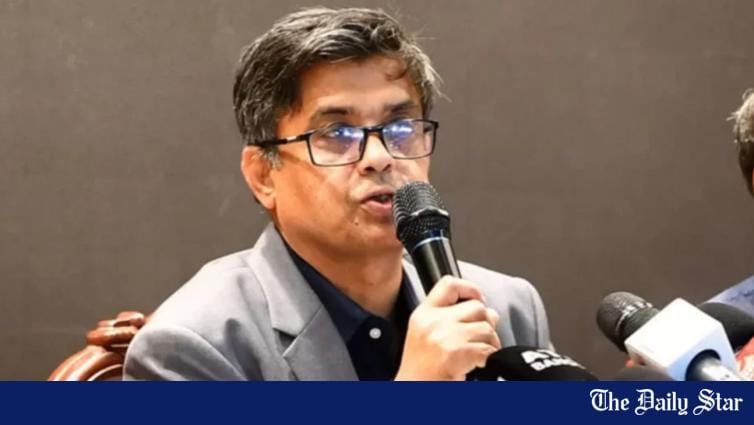Saif
Senior Member
- Joined
- Jan 24, 2024
- Messages
- 16,790
- Likes
- 8,152
- Nation

- Residence

- Axis Group


We haven’t started drafting July proclamation yet, says Advisor Rizwana
Drafting of July proclamation yet to begin: Rizwana The interim government has yet to begin drafting the July proclamation despite a 15-day deadline set by the Anti-discrimination Student Movement and the National Citizens’ Committee. Speaking to journalists outside the Secretariat on Wedne
We haven’t started drafting July proclamation yet, says Advisor Rizwana
bdnews24.com
Published :
Jan 01, 2025 19:43
Updated :
Jan 01, 2025 19:45

Drafting of July proclamation yet to begin: Rizwana
The interim government has yet to begin drafting the July proclamation despite a 15-day deadline set by the Anti-discrimination Student Movement and the National Citizens’ Committee.
Speaking to journalists outside the Secretariat on Wednesday, Environment, Forest, and Climate Change Advisor Syeda Rizwana Hasan provided an update on the status of the proclamation and responded to inquiries about its progress.
“We have not drafted the 'July proclamation' yet. The drafting process will begin soon,” she said.
When asked about consensus among all parties, Rizwana expressed optimism, saying: “Most parties broadly agree on the necessity of a proclamation. We expect their support.
“Since everyone will have the opportunity to participate in the drafting process, there should be no reason for disagreement.”
The advisor claimed that the Muhammad Yunus-led government prioritises both reforms and elections in its agenda.
She said, “From discussions with politicians, it’s clear that there is a desire for reforms. Some want fundamental reforms before elections, while others prioritise elections first.
“For us, both issues hold equal importance.”
Regarding BNP’s demand for elections, Rizwana said: “During discussions with BNP, they never said reforms are unnecessary.
“They recognise the need for reforms and are offering their own views on the matter.”
She continued, “They are also providing written opinions. This indicates that politicians also want reforms.
“The extent of the reforms, the areas they will cover, and the mechanisms for implementing them are aspects where politicians hold specific positions.
“Our chief advisor has said that a separate commission will be formed to reach a consensus, and he will lead it himself.”
Rizwana clarified that a legal process is already under way regarding the repatriation of deposed prime minister Sheikh Hasina.
She said, “A letter has been sent as part of the legal process to bring Sheikh Hasina back. We have made our stance clear on the matter, and we have also highlighted our treaty with India, which includes certain exceptions.
“What stance India will take and how long it will take is uncertain, but we must leave that for the future.
“Our position remains that we want trials to take place in her presence. If that is not possible, we will proceed with the judicial process as required.”
In response to a question about whether the Awami League will be able to contest elections, Rizwana said: “It is not for us to decide which parties will contest. Any party wishing to participate can do so.
“These matters will be handled by the Election Commission.”
She concluded, “The government has not yet expressed any opinion on this matter. No stance has been taken regarding banning the Awami League.”
bdnews24.com
Published :
Jan 01, 2025 19:43
Updated :
Jan 01, 2025 19:45
Drafting of July proclamation yet to begin: Rizwana
The interim government has yet to begin drafting the July proclamation despite a 15-day deadline set by the Anti-discrimination Student Movement and the National Citizens’ Committee.
Speaking to journalists outside the Secretariat on Wednesday, Environment, Forest, and Climate Change Advisor Syeda Rizwana Hasan provided an update on the status of the proclamation and responded to inquiries about its progress.
“We have not drafted the 'July proclamation' yet. The drafting process will begin soon,” she said.
When asked about consensus among all parties, Rizwana expressed optimism, saying: “Most parties broadly agree on the necessity of a proclamation. We expect their support.
“Since everyone will have the opportunity to participate in the drafting process, there should be no reason for disagreement.”
The advisor claimed that the Muhammad Yunus-led government prioritises both reforms and elections in its agenda.
She said, “From discussions with politicians, it’s clear that there is a desire for reforms. Some want fundamental reforms before elections, while others prioritise elections first.
“For us, both issues hold equal importance.”
Regarding BNP’s demand for elections, Rizwana said: “During discussions with BNP, they never said reforms are unnecessary.
“They recognise the need for reforms and are offering their own views on the matter.”
She continued, “They are also providing written opinions. This indicates that politicians also want reforms.
“The extent of the reforms, the areas they will cover, and the mechanisms for implementing them are aspects where politicians hold specific positions.
“Our chief advisor has said that a separate commission will be formed to reach a consensus, and he will lead it himself.”
Rizwana clarified that a legal process is already under way regarding the repatriation of deposed prime minister Sheikh Hasina.
She said, “A letter has been sent as part of the legal process to bring Sheikh Hasina back. We have made our stance clear on the matter, and we have also highlighted our treaty with India, which includes certain exceptions.
“What stance India will take and how long it will take is uncertain, but we must leave that for the future.
“Our position remains that we want trials to take place in her presence. If that is not possible, we will proceed with the judicial process as required.”
In response to a question about whether the Awami League will be able to contest elections, Rizwana said: “It is not for us to decide which parties will contest. Any party wishing to participate can do so.
“These matters will be handled by the Election Commission.”
She concluded, “The government has not yet expressed any opinion on this matter. No stance has been taken regarding banning the Awami League.”





